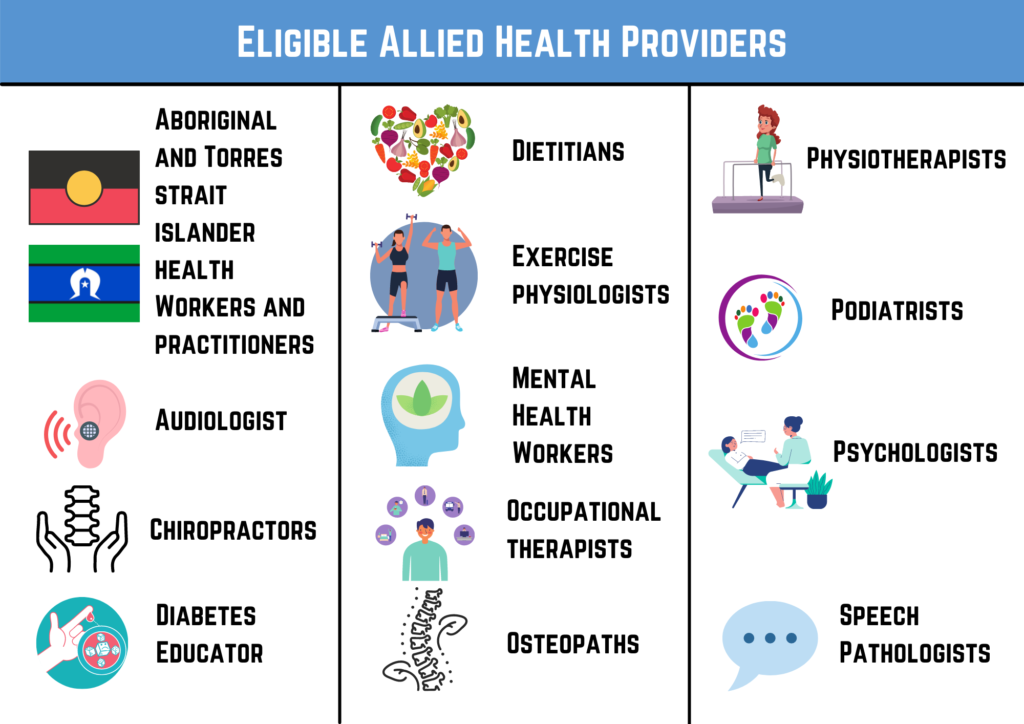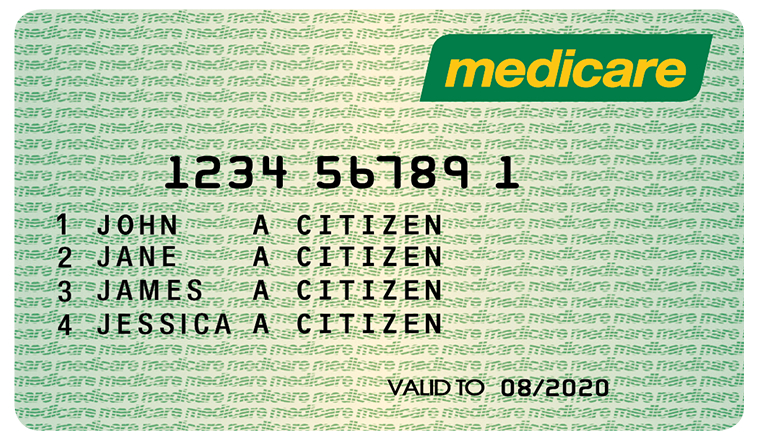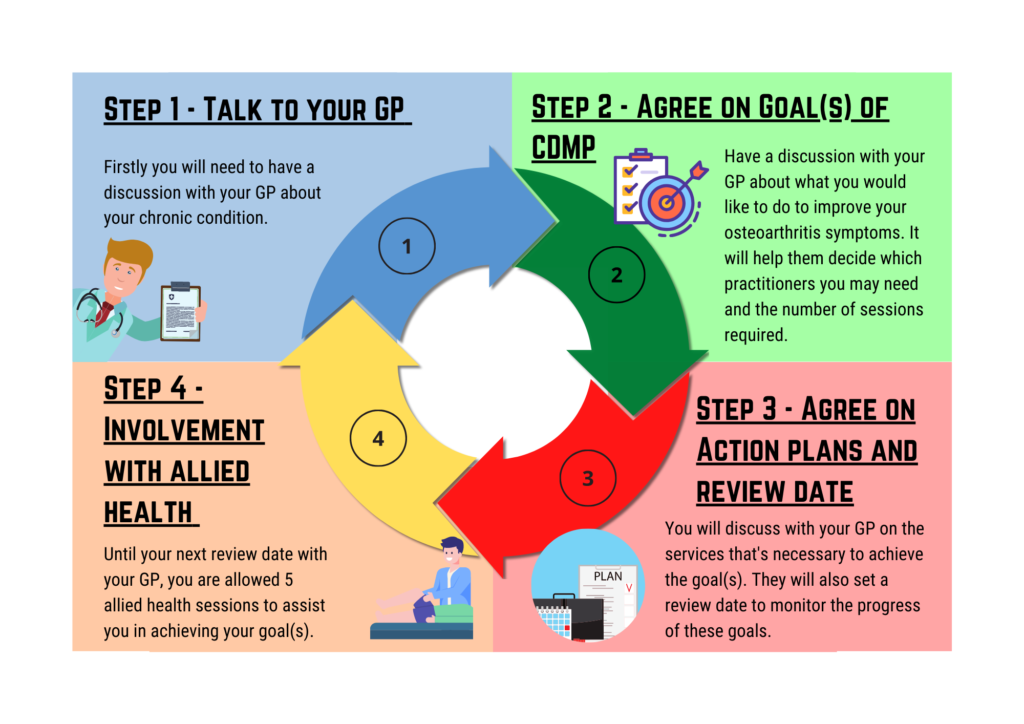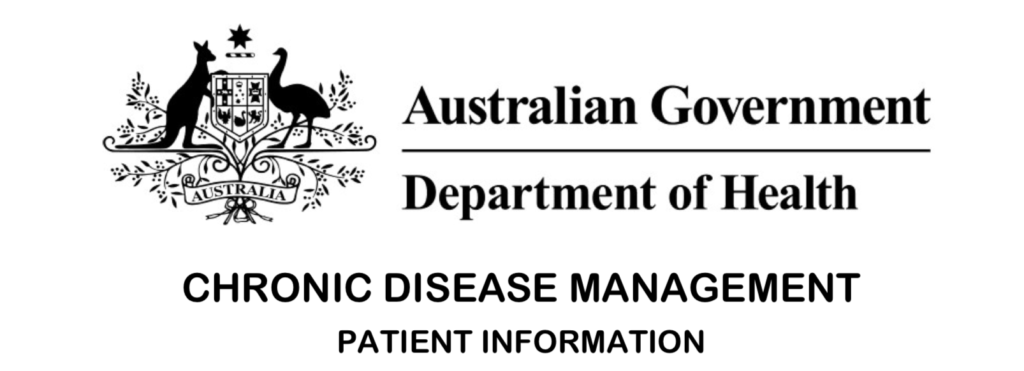Chronic disease management plan (previously known as Enhanced Primary Care) is a service on the Medicare Benefits Scheme. It is one way that you can receive subsidised care that you may need for you knee osteoarthritis. This page was designed to inform you more about this option so that you may consider it if it is appropriate for you.
As described above, the Chronic Disease Management Plan (CDMP) is a government service provided under the Medicare Benefits Scheme. It allows individuals with a chronic health condition to receive up to 5 fully covered, or subsidized allied health service each calendar year (1st of January to the 31st of December) to treat that chronic health condition.
The service is co-ordinated by the individual’s GP – who will determine the combination and number of services that is necessary, in conjunction with the individual’s goals and wishes.
The list below are the allied health providers that are eligible to provide care under the CDMP.

Through CDMP, your GP may identify that you need the assistance of an allied health practitioner to help you manage your symptoms. These allied health practitioners may include include:
- Physiotherapists who may be able to help and guide you in how to start increasing your physical activity. They can also help you find suitable exercises that fits into your life with the goal of reducing your arthritis symptoms and increasing your functional capacity. They can also help you learn more about knee osteoarthritis and provide advice when symptoms flare-up. To learn more about what exercise can do for your arthritic knee click here.
- Dietitians who may be able to educate and assist you in weight loss and/or weight management. Just a 5% reduction in body weight can significantly improve your arthritis symptoms and general health. To learn more about what weight management can do for your knee click here.
- Podiatrists who may be able to guide you to find the right orthoses or footwear that can help manage your knee osteoarthritis. For more information about shoes, footwear and knee osteoarthritis click here.
- Psychologists and mental health workers who may be able to help you in navigating through some beliefs you may have about knee osteoarthritis. Unfortunately, psychological and lifestyle factors such as having high stress level, having anxiety or depression influence the level of pain an individual with knee osteoarthritis might experience. Psychologists and counsellors will be able to help you navigate through these factors.
Under the CDMP, you are eligible for up to 5 sessions of allied health per calendar year. The allied health providers must also be registered with Medicare Australia.
The fee depends on the allied health provider. For some providers, the fee may be fully covered, however for others, you may have to pay a ‘gap’ fee – currently, the rebate is approximately $53.
To be eligible for the CDMP, you need to be a Medicare card holder, and you must have a chronic condition.

A chronic condition is any condition that has been (or likely to be) present for six months or more. Examples of this includes asthma, cancer, cardiovascular disease and diabetes.
Knee osteoarthritis is also considered a chronic condition – so yes you would be eligible!
- To get started on CDMP you must first discuss your chronic condition with your GP. Only GPs can set up the CDMP
- You may talk about some of the goals that you might want to achieve, that you may need help with from an allied health practitioner.
- After this discussion, your GP will help identify what allied health practitioners you may need to see, and for how long you may need to see them for. Together you will also set review dates, so that you and your GP can monitor the progress.
- Until the next review date, you can be involved with up to 5 allied health services (per calendar year). In the context of knee osteoarthritis, you may see a physiotherapist who can help you with finding the right exercises to do, a dietitian to help you with weight management and diet, or a podiatrist who may advice you on different types of orthotics.
Below is a simplified version of the whole process.

It is important to note that the 5 allied health sessions provided per calendar is a total number, not 5 per disciplines. As an example, for an individual with knee osteoarthritis, the GP might identify that they may need 3 sessions with the physiotherapists and 2 with the dietitians – that will be their 5 sessions for the year.
There is also a requirement that there is a 3 months period from the commencement of one CDMP before being eligible for another CDMP. This means that someone who may have started their CDMP in December and has used the 5 sessions in that month, will not be eligible for another CDMP in January the following year. Instead they will be eligible in April the following year.
